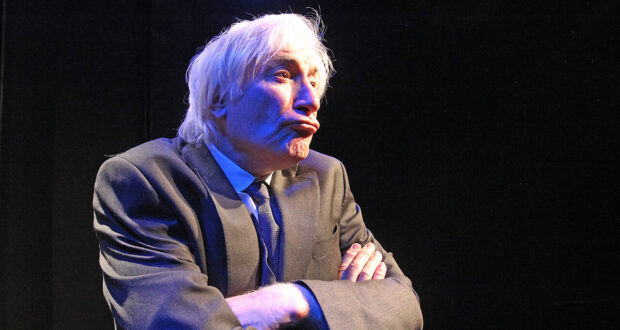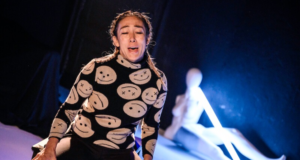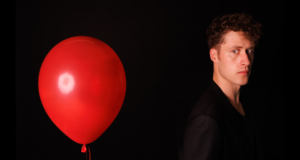This one man show, containing an intense performance, is a passionate celebration of Franz Kafka’s writing. A must see for all diehard Kafka fans.Summary
Rating
Good
One hundred years ago this week Franz Kafka was buried in Prague. Most of his best-known works were published posthumously after a close friend refused Kafka’s instruction to burn all his unpublished writing after his death. The story of Kafka’s rise to global fame and influence has as much to do with what happened after he died than what happened during his life.
This posthumous impact is the main theme of Jack Klaff’s one man show, Kafka, performed at Finborough Theatre to mark the 100th anniversary of the great writer’s death.
The most striking thing about Kafka is Klaff’s intense, full-bodied performance. Kafka consists only of Klaff on stage, playing all the characters, without sets. The only costume is a grey suit, the only prop a small stool. In this extremely minimalist space, Klaff delivers a passionate monologue of Kafka’s life and the events after his death.
Klaff moves seamlessly between a huge range of characters; Kafka himself, his friends, family, lovers and famous people who were influenced by him. He deftly portrays such diverse figures as Albert Einstein, Bertolt Brecht, David Foster Wallace, Hermann Kafka, Orson Welles and others. These quick vignettes, rendered through speech and action alone, are compelling as Klaff gives each character a distinctive voice and mannerism. I especially laughed at Brecht dismissing Kafka as part of the bourgeoisie, but this is undoubtably a rather niche joke.
There is an impressive tonal variation. The short scenes move from heartbreaking stories about Kafka’s life and his illness, to humorous moments that help break the tension and prevent it becoming too bleak. These are woven together into a complete whole that has emotional highs and lows, which feel part of a consistent artistic vision.
But this lack of a clear structure does makes it harder to be emotionally invested. There is no firm narrative and little sense of progression, or a point the show is moving towards, so it is difficult to place yourself within the story and thus feel rising dramatic or emotional tension.
The final moments do link the characters and theme together into an impactful section exploring Kafka’s death and the events that followed, as told by the people who remembered him. This covers the events after his death that led to his fame and builds to a powerful emotional climax that ended on a high.
This is a detailed exploration of Kafka and his writing. There are a lot of references to characters, situations, prose and dialogue from his writing. If you are a fan of Kafka then you will really enjoy the little nods towards his writing; especially the obscure, fragmented and unfinished works referenced.
Yet as someone only familiar with Kafka’s most famous work, most of these references are lost on me, leaving it harder to follow. If you are not familiar with the key literary or philosophical figures of the 20th century, then many of the characters and references may well be too obscure.
The beauty of Kafka is its conceptual simplicity and the very strong performance from Klaff, who is riveting to watch. A stronger structure or narrative would make Kafka more engaging, but it does build to a moving emotional finale. If you love Kafka, then you will love this show. If not, then you might find it hard to follow but you can still enjoy being immersed in the great writer’s works.
Translated, devised and performed by Jack Klaff
Set design by Jaroslav Nemrava
Sound design by Zdena Sedlaček
Stage management by Ted Walliker
Direction and lighting design by Colin Watkeys
Produced by Bonne Idée Productions in association with Neil McPherson for the Finborough Theatre
Kafka plays at the Finborough Theatre until Saturday 6th July.
Further information and booking can be found here.
 Everything Theatre Reviews, interviews and news for theatre lovers, London and beyond
Everything Theatre Reviews, interviews and news for theatre lovers, London and beyond



